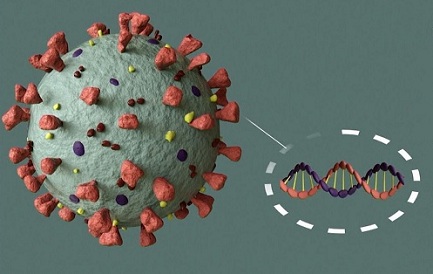New SARS-CoV-2 Variant B.1.525 With More Than 20 Mutations Including E484K, 9 Non-Synonymous And 69-70 Spike Deletion Emerges in Britain!
Source: B.1.525 Variant Feb 16, 2021 4 years, 2 months, 1 week, 3 days, 21 hours, 27 minutes ago
While the United Kingdom is celebrating its milestone of hitting more than 15 million vaccinations, a new concerning SARS-CoV-2 variant has made its debut in the country with more than 32 cases so far identified and more worrisome is the fact that there could be thousands more as the new variant also yields a S gene dropout in PCR tests, making it more difficult to be picked up by current testing protocols.

The UK can forget about it concerns about the B.1.1.7 variant as this new
B.1.525 variant also carries the immune evasive E484K mutation not to mention other worrying new mutations.
The new B.1.525 variant has about 20 mutations, 9 non-synonymous mutations, the 69-70 spike deletion seen in the initial UK B.1.1.7 variant, the nsp6 deletion seen in the B.1.351 variant in South Africa and P.1 variant in Brazil.
It also features the Q677H and F888L mutations and a 144 deletion.
https://github.com/cov-lineages/pango-designation/issues/4
This new and fast emerging B.1.525 variant has been analyzed by researchers at the University of Edinburgh using genome sequencing data.
https://cov-lineages.org/global_report_B.1.525.html
The researchers say the variant has similar characteristics to the Kent variant, B117, and includes the E484K mutation to the spike protein.
The E484K mutation is present in variants that emerged in South African and Brazil and is thought make the virus better able to evade neutralizing antibodies produced by the body.
Dr Simon Clarke, an Associate Professor in Cellular Microbiology of the University of Reading, told Thailand Medical News, “We don’t yet know how well this new variant will spread, but if it is successful it can be presumed that immunity from any vaccine or previous infection will be blunted…”
He added, “I think that until we know more about these variants, any variants which carry E484K should be subject to surge testing as it seems to confer resistance to immunity, however that is generated.”
Dr Ravi Gupta, a professor of clinical microbiology at the University of Cambridge, agreed surge testing for the new variant was warranted, noting that as well as the E484K mutation it had another change “that likely helps it escape from our antibodies”.
However Professor Dr Jonathan Stoye, a group leader at the Francis Crick Institute, said that while the variant was clearly spreading, surge testing had problems, including that those most at risk of spreading COVID-19 may not come forward, for example because they cannot afford financially to test positive.
Dr Stoye said it was not surprising that the new variant contained some familiar mutations. He said, “The minute you start putting selection pressure on this virus, you start selecting particularly for things that give it the ability to escape immune responses, and I think that is what we are seeing here.”
The B.1.525 variant is the subject of a report by researchers at the University of Edinburgh, who say it has been de
tected through genome sequencing in 10 countries including Denmark, the US and Australia, with 32 cases found in the UK so far. The earliest sequences were dated to December and cropped up in the UK and Nigeria.
While it was unclear what effect many of the mutations on this new B.1.525 variant may have on the ability of the coronavirus to establish an infection, or on the severity of disease, the presence of the E484K mutation was known in the South Africa variant to confer a degree of resistance to some vaccines.
Meanwhile the new B.1.525 variant was also identified in British Columbia last Friday.
Provincial health officer Dr Bonnie Henry told media, “We aren't entirely clear yet whether this variant also has increased transmissibility or causes more severe illness, but our lab team is working with their counterparts across the country and internationally to get a better understanding of what this can mean.”
This new case identified in British Columbia was linked to travel to Nigeria.
Experts in the UK have said the new variant calls for “surge testing” until more is known about it.
It is gradually emerging that as the world goes through a major vaccination programme against the COVID-19 disease, all these monies and resources spent might eventually turn out to be futile and a wasted effort as more and more variants are fast emerging and rapidly becoming prevalent in circulation.
The WHO has already warned of more reinfections arising from the new variants.
https://twitter.com/therecount/status/1360261856313683971?s=20
For more on the
B.1.525 Variant, keep on logging to Thailand Medical News.
